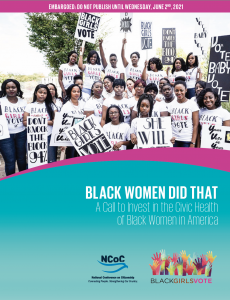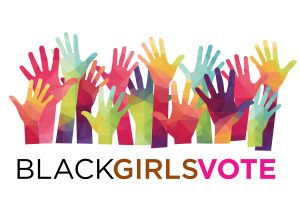Download full report (.pdf)
Black women are widely recognized as champions of democracy: turning out and organizing massive numbers of people amidst the COVID-19 pandemic. Their arduous labor did not solely increase turnout–it also reinvigorated the spirit of democracy in communities that policymakers and governing bodies often neglect.
From the work of Stacey Abrams, Latosha Brown, Nse Ufot, and countless other organizers, Black women were overwhelmingly credited for their extraordinary and monumental efforts to engage, educate, and activate Black voters. Along with the recognition of Black women organizers, the nation elected our first Black and South Asian woman vice-president–cementing Black women’s efforts to uphold American democracy in history.
 This report, Black Women Did That: The Need to Invest in the Civic Health of Black Women in America seeks to expand current discourse concerning Black women’s civic participation. Additionally, it provides policy recommendations to improve educational, economic, and health outcomes for Black women.
This report, Black Women Did That: The Need to Invest in the Civic Health of Black Women in America seeks to expand current discourse concerning Black women’s civic participation. Additionally, it provides policy recommendations to improve educational, economic, and health outcomes for Black women.
Black Girls Vote is producing this report to underscore the role Black Women play in our civic life and to recommend policy changes to address Black women’s unique needs. Our motivation for publishing these findings is rooted in our commitment to supporting Black women as they utilize their vote as their voice. We hope that this report further encourages those committed to community empowerment and social betterment to uplift Black women’s civic efforts. As the 2020 election demonstrated, an investment in Black women’s advancement leads to society’s amelioration as a whole.
Get involved with the work of Black Girls Vote.
Key Findings
Black women have high voter registration and voting rates. However, they fall behind in non-electoral participation, such as providing campaign donations, attending school board meetings, or calling public officials. Oftentimes calls to lobby elected officials, attend events and public meetings to advocate ignore that Black women may have other responsibilities and lack time to commit to such activities.
Black women had the highest voting percentage in local elections in 2018 (56.4%), highlighting their commitment to making their voices heard at all governmental levels.
To a significant extent, Black women prioritize political knowledge acquisition and dissemination. 71.5% reported that they frequently read, watch, or listen to news about political, societal, or local issues.
“Black women are often credited with saving this country, but are forgotten about when it comes to our broader contributions to democracy,” said Nykidra Robinson, founder and CEO of Black Girls Vote. “We hope this report helps to illuminate that civic-engagement for Black women is in everything we do and encourages those in positions of power to make the necessary policy changes to make the future better for generations of Black women to come. When Black women win, we all do.”
An investment in the civic health of Black women also means an investment in the following policies:
Education: Implementing alternative disciplinary practices in schools, increasing research of the incidence and effects of disproportionate punitive discipline of Black girls, and investing in Black women’s access to postsecondary education through federal funding.
Economic Development: Prioritizing Black businesses in the nation’s economic recovery plan, undertaking a federal compensation audit of all private and public employers, and creating employment pipeline programs for Black women.
Healthcare: Improving the health of Black women by addressing disproportionate maternal mortality and breast cancer rates, expanding Medicaid access at the state and federal level, increasing data collection and research of Black women’s experiences with health care systems, and addressing the social determinants of health.
AUTHORS:
Danielle Miles-Langaigne, University of Pennsylvania
Hoda Abdalla, Harvard College
Nykidra “ Nyki” Robinson, MPA, CEO and Founder of Black Girls Vote
Natasha Murphy, MSPH, Chief of Staff, Black Girls Vote
Nia Duggins, BGV Advocacy
